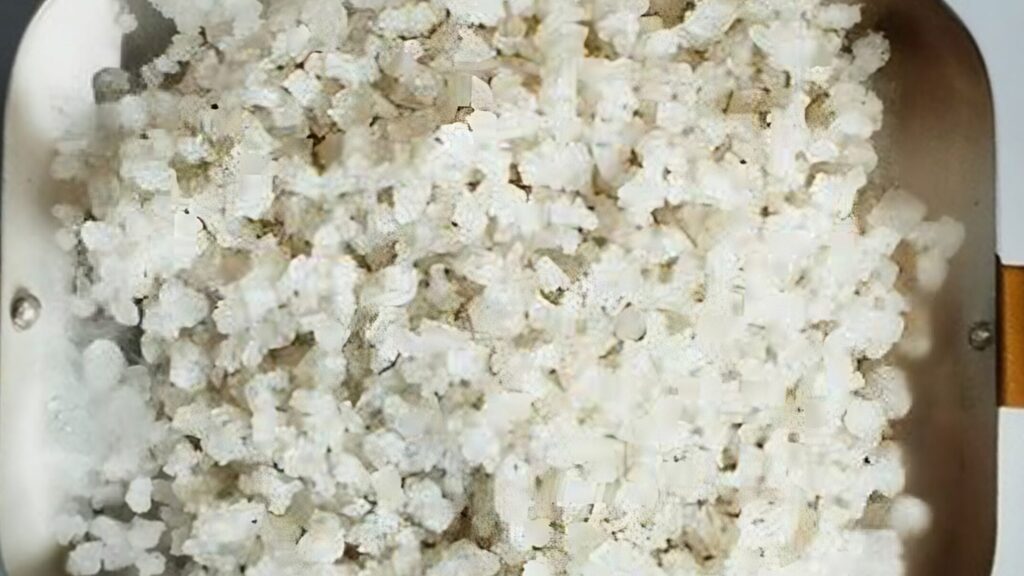Celtic salt is a historical inheritance from the ancient Celts, who were skilled in obtaining salt from the ocean. In the coastal areas of France, Celtic salt is collected using traditional methods passed down through generations.
The real beauty of this salt is that it is not heavily processed like other salts, which is why it has a rich mineral content.
Depending on the impurities and mineral concentration, it could be Off-white, Grey, or Brownish in appearance (color variation is mainly due to the Iron content).
Nutritional Profile:
Major Content:
Like other salts, a major component of it is Sodium chloride (NaCl), but what makes it stand out is that Celtic salt contains a rich concentration of essential minerals and trace elements frequently removed during the processing of other types of salt.
Essential Minerals:
- Magnesium: Needed for protein synthesis, blood pressure control, and energy production.
- Potassium: Helps to regulate fluid balance, nerve signal conduction and maintains regular heartbeat.
- Calcium: Essential for strong teeth and bones, blood clotting after injuries, and nerve signals.
- Iron: It makes haemoglobin, which transports oxygen to the blood.
Trace Elements:
These include zinc, manganese, copper, molybdenum, boron, and selenium, among other trace elements that give it a distinctive taste and health benefits.
Beneficial Properties of Celtic Sea Salt:
Supplementing the electrolytes and maintaining good hydration:
Sweating in summer or strenuous exercises can cause loss of electrolytes along with dehydration in the body. One of the benefits of Celtic salt is that it adds up the lost minerals and hence causes water retention in the body.
Improves digestion:
Like other salts, Celtic salt’s sodium chloride content is essential for acid production in the stomach and digestive process. It also increases saliva secretion, which contains different enzymes. Hence, consuming a moderate amount of salt is beneficial for gut health and nutrient absorption in the intestines.
Stress control:
Celtic salt enables the adrenal gland to work properly, which in turn helps the body to manage stress and enhance hormonal functioning.
Body’s pH maintenance:
An increase or decrease in the body’s pH levels beyond a certain range of 7.35 – 7.45 can be disastrous for human survival as the biochemical reactions in the body need an optimum pH to work properly. Celtic salt plays a vital role by increasing the pH and preventing the adversity of acidosis.
Healthier skin:
Celtic salt serves not only as a food seasoning but also as a beneficial substance for your skin. Due to its mineral-rich properties, it can be used for bathing and scrubbing purposes. It has detoxifying attributes and rejuvenates the skin.
Maintains teeth and bone:
Due to its abundance of calcium and other minerals, Celtic salt helps maintain good teeth and bone health. However, it is important to note that Celtic salt lacks iodine content, which is crucial for thyroid functioning. Hence, a low-iodized diet can lead to hypothyroidism.
Improves Food flavour:
It makes the food more palatable and gives it a unique and scrumptious taste.
Advice:
While the benefits are huge, it’s important to consume Celtic salt thoughtfully, especially if you have specific health concerns. For example, in hypertensive patients, it is recommended to limit sodium intake regardless of the source, whether it’s table salt, sea salt, or Celtic salt.
According to American Health Association (AHA) guidelines, the maximum daily salt intake is 2300 mg (1 teaspoon). For hypertensive patients, it is 1500 mg/day. Always consult your healthcare provider before consuming such products.
Visit our blog section to read more.






